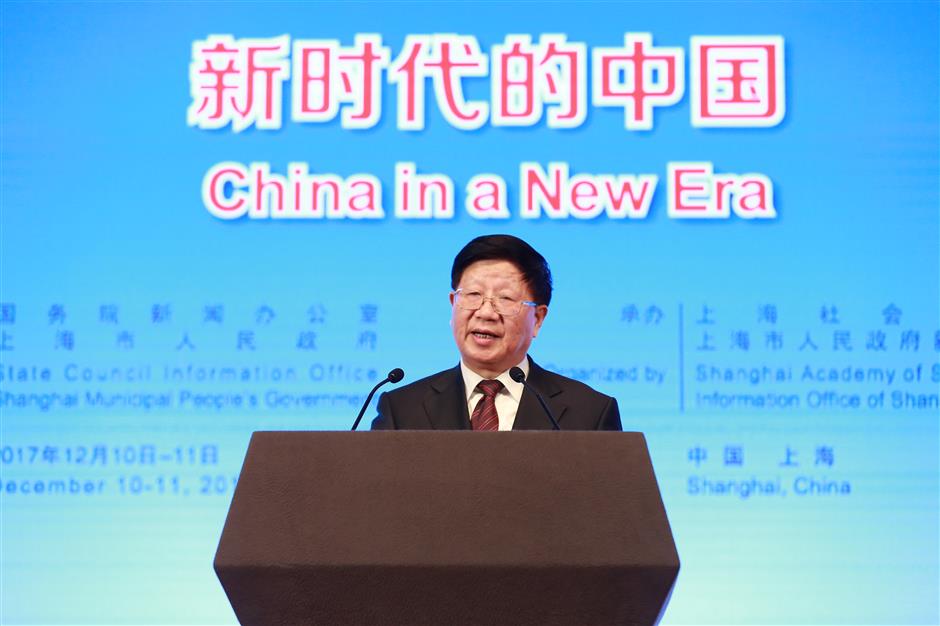Understanding China and the new era an ever moving feast

“China is now so big. The world now has a natural interest in understanding what China is now doing in the world.” — Kevin Rudd

“Only under the CPC’s leadership have we come closest to... reaching the goal of national rejuvenation.” — Li Junru
With a history spanning centuries, Sinology has changed profoundly over time as the academic focus of researchers shifts to adapt to new situations and realities.
The latest shift came after the 19th National Congress of the Communist Party of China. New expressions like “Socialism With Chinese Characteristics For a New Era” have called for an adjustment of research about China.
Li Junru, former vice president of the Party School of the CPC Central Committee, said at the recent Seventh World Forum on China Studies that students of China today must grasp the meaning of this “new era” to understand how China’s domestic and foreign policies will transpire.
This requires bearing several new developments in mind. For example, as was outlined in President Xi Jinping’s address to the congress, the principal contradiction facing Chinese society in the new era is one between unbalanced and inadequate development and people’s ever-growing needs for a better life.
In addition, Li observed that Xi has supplied his vision of solving international problems by virtue of “Chinese solutions” on many occasions. And these solutions can be summed up with the slogan: build a community of shared future for mankind and achieve shared and win-win development.
Until now, the various schools of international relations theory, mostly originated from the West with their emphasis on great power dominance, balance of power, or geopolitics, all prove ineffectual in solving global problems.
The CPC thus has proposed the construction of a community of shared future for mankind on the basis of forging common interests.
Li believed that due academic attention should be given to the research of not just socialism in the new era, but to the role played by the CPC in ushering in that very era. “Only under the CPC’s leadership have we come closest to, and are most confident about, reaching the goal of national rejuvenation,” he explained.
Kevin Rudd, president of the Asia Society Policy Institute, has been one of the veteran China watchers who witnessed first-hand the long way China has come.
Deliver on big ambitions
In recalling his years as a diplomat based in China, the ex-prime minister and foreign minister of Australia said he is always amazed by the country’s ability to deliver on its big ambitions.
In the early 1990s, his first impression upon hearing the announcement by Zhu Rongji, then mayor of Shanghai who would later become China’s premier, that Pudong would witness better development, was that “he is probably daydreaming,” because “there is nothing on the other side of the Huangpu River,” except rice paddies and vast expanses of wilderness.
But now “Pudong is the epitome of the ‘Chinese Dream’ come true,” he said.
Thirty-five years ago, those interested in the CPC’s national congresses were mainly scholars or diplomats, said Rudd, but now the eyes of the whole world are fixated on these gatherings, in search of the slightest clues as to where the country might be headed.
The reasons are very simple, he said, because “China is now so big. The world now has a natural interest in understanding what China is now doing in the world.”
Rudd attributed the claims of some Western scholars that Chinese policies lack transparency to the fundamental differences between Chinese and Western political cultures.
Fang Zhen
History shows that Chinese policy development, both domestic and foreign, has usually been laid out as a general strategic direction, or fang zhen in Chinese.
And policy details often emerge much later in the process.
Rudd suggested that Chinese policy makers see outsiders’ requests for more details of China’s policies as a desire to understand what the growth of China means for each of them in their particular country, region, industry and profession.
It is not only in China’s best interests to help the global audience better appreciate the impact of its policies on them, actually “those who are responsible for the study of China around the world must share this burden as well,” he said.
Since many of China’s strategic thoughts are scattered in ancient classics, this means scholars have to deploy all the resources of classical Sinology to understand the historical, intellectual and cultural content of new political concepts such as “Socialism With Chinese Characteristics For a New Era.”
Rudd said mutual understanding between China and the West is necessary to avert possible misinterpretation or miscommunication.















